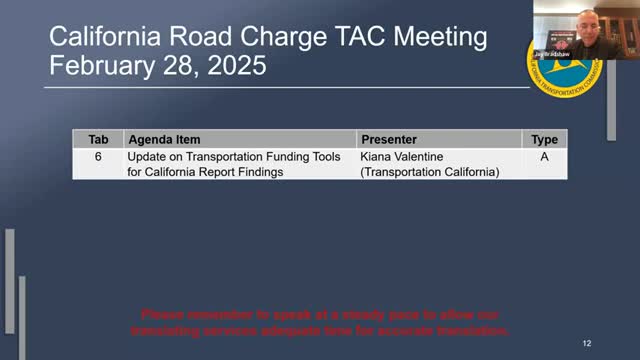Industry review recommends phased road‑user charge starting with zero‑emission vehicles
Get AI-powered insights, summaries, and transcripts
Subscribe
Summary
Kiana Valentine, executive director of Transportation California, told the California Road Charge Technical Advisory Committee on Feb. 21 that a literature review commissioned by her organization recommends a mixed, phased approach to replace or supplement fuel excise taxes — starting with a road‑user charge for zero‑emission vehicles (ZEVs).
Kiana Valentine, executive director of Transportation California, told the California Road Charge Technical Advisory Committee on Feb. 21 that a literature review commissioned by her organization recommends a mixed, phased approach to replace or supplement fuel excise taxes — starting with a road‑user charge for zero‑emission vehicles (ZEVs).
The review, Valentine said, evaluated more than 20 funding tools against seven tax principles — simplicity, robustness, fairness/equity, sustainability, efficiency, security/privacy and integration — and concluded the highest‑performing option is a phased model that keeps fuel taxes and registration charges for internal‑combustion vehicles while rolling out a distance‑based RUC for ZEVs.
“The states that are doing kilowatt‑hour taxes…are doing it on public chargers,” Valentine said. “Road user charge might be and likely is easier to implement from an administrative, feasibility perspective.” She also summarized the study’s political finding: “I am a fan of…moving the ball down the field a little bit at a time,” meaning a phased start with ZEVs is more viable politically than an immediate, system‑wide switch.
Nut graf: The review responds to an anticipated decline in fuel‑excise tax revenue as vehicles become more fuel efficient and California moves toward zero‑emission vehicle sales. The California Transportation Commission estimated a roughly $31.3 billion shortfall in fuel‑excise tax revenue over the next decade, Valentine said, and the review is intended to identify practicable, privacy‑respecting, politically feasible alternatives.
Valentine described three high‑level options the study analyzed: keep and expand fuel taxes (including taxes on electricity and hydrogen); implement a full, distance‑based RUC for all vehicles and eliminate fuel excise taxes; or adopt the mixed, phased model (the review’s recommendation). She said the researchers whittled more than 20 possible tools down to seven that received detailed analysis.
The presentation emphasized tradeoffs. Fuel excise taxes remain administratively cheap and broadly applicable, but they are declining in effectiveness as more drivers shift to ZEVs and higher‑efficiency vehicles. Kilowatt‑hour taxes for electricity were judged administratively and politically challenging — including measurement, multifamily charging and privacy concerns — though they may have a niche role for public chargers and out‑of‑state vehicles. A pure RUC was judged effective but politically difficult to implement at once, prompting the recommendation to phase in RUC beginning with ZEVs.
Valentine said Transportation California also conducted voter research: an industry‑sponsored statewide poll (800 responses) and eight focus groups. She reported the focus groups showed majority support for a RUC applied first to ZEVs, including among many EV drivers who acknowledged they pay less in fuel taxes than drivers of internal‑combustion vehicles. “There was a light‑bulb moment,” Valentine said, when participants compared who currently pays more or less to support roads.
Committee members and attendees discussed equity and rural impacts. Misty Rickwall, representing Northern/rural interests, stressed long travel distances and difficult terrain that make ZEV ownership impractical for some residents and asked about tribal and rural outreach; Valentine said tribal and rural outreach is planned and that she has been traveling statewide to present findings. Supervisor Robert Poitras and other committee members reaffirmed support for the concept while noting political constraints and the need for a practical backup (for example, adjustments to registration fees) if lawmakers are unwilling to adopt RUC immediately.
Public commenters and stakeholders urged faster action or incremental approaches. Mitch Weiss (public) urged administration action and suggested TIF/registration adjustments could be implemented sooner; Gus Quarry (county government stakeholder) suggested a revenue‑neutral conversion of existing fees could save money for some vehicle owners while broadening the revenue base.
Valentine said Assemblymember [Assemblymember] Wilson introduced a placeholder bill (referred to in the meeting as AB 1421) that would extend the legislative authority for further study and set a platform for continued work on funding options.
Ending: Transportation California said it will release the full report and appendices next week and will continue public and legislative outreach, town halls and further research on heavy‑duty and hybrid vehicle treatments. The committee set no formal action on the literature review at this meeting.
